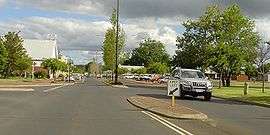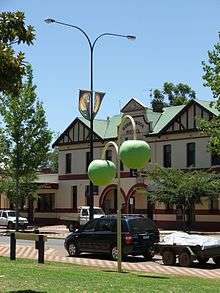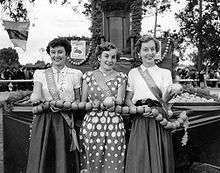Donnybrook, Western Australia
| Donnybrook Western Australia | |||||||
|---|---|---|---|---|---|---|---|
 Donnybrook Main Street | |||||||
 Donnybrook Location in Western Australia | |||||||
| Coordinates | 33°35′S 115°49′E / 33.58°S 115.82°ECoordinates: 33°35′S 115°49′E / 33.58°S 115.82°E | ||||||
| Population | 1,933 (2006 census)[1] | ||||||
| Established | 1894 | ||||||
| Postcode(s) | 6239 | ||||||
| Elevation | 63 m (207 ft)[2] | ||||||
| Location | 30 km (19 mi) from Bunbury | ||||||
| LGA(s) | Shire of Donnybrook-Balingup | ||||||
| State electorate(s) | Capel | ||||||
| Federal Division(s) | Forrest | ||||||
| |||||||
Donnybrook is a town situated between Boyanup and Kirup on the South Western Highway, 210 kilometres (130 mi) south of Perth, Western Australia. The town is the centre of apple production in Western Australia. The town is also known for its picturesque abundance of English Oak trees.
History
The town of Donnybrook was gazetted in 1894.[3] It was first settled around 1842 when George Nash and others moved to the area.[3] They named the place "Donnybrook" after the suburb of Dublin, Ireland that they came from.[3] The eastern part of the town was formerly called Minninup.[3] The western portion of the townsite is currently known as Irishtown.
The population of the town was 430 (294 males and 136 females) in 1898.[4]
In 1897, Richard Hunter discovered gold about 6 kilometres south of the Donnybrook townsite.[5] Hunter eventually sold out to Fred Camilleri (a well known prospector from Kalgoorlie) and Camilleri was able to interest the internationally renowned Polish geologist Modest Maryanski.[6] It was on the basis of Maryanski's report that a new company "Donnybrook Goldfields Ltd" was floated on the London Stock Exchange in 1899.[6] A mini gold rush occurred, resulting in the Government gazetting the Donnybrook Goldfield - in the process making provision for a new town to be called "Goldtown".[5] From the census of 1901, it was known over 200 gold miners were camped on the goldfields.[5] The excitement was short-lived however, and the Hunters Venture mine closed in August 1903.[5] The area was worked during the Great Depression by locals Laurie and Foster Payne, then re-pegged and explored during the 1980s and again from 2004-5.[5]
Industry
Donnybrook is the home of Western Australia's apple industry.[7] In 1900, the first Granny Smith apple tree was planted, and the apple orchard industry grew after World War I.[8]
Apples are harvested between March and May, with apple blossoms prominent in October.[7] Donnybrook's industries also include timber, beef, dairy and viticulture.[7] Many visiting backpackers earn money by picking fruit from orchards in the area between November and June.[9]
Geography
Climate
Donnybrook experiences a Mediterranean climate (Köppen climate classification Csa).
| Climate data for Donnybrook | |||||||||||||
|---|---|---|---|---|---|---|---|---|---|---|---|---|---|
| Month | Jan | Feb | Mar | Apr | May | Jun | Jul | Aug | Sep | Oct | Nov | Dec | Year |
| Average high °C (°F) | 30.4 (86.7) |
30.4 (86.7) |
27.9 (82.2) |
24.0 (75.2) |
20.0 (68) |
17.4 (63.3) |
16.5 (61.7) |
17.2 (63) |
18.8 (65.8) |
21.0 (69.8) |
24.8 (76.6) |
28.2 (82.8) |
23.0 (73.4) |
| Average low °C (°F) | 13.9 (57) |
14.3 (57.7) |
12.8 (55) |
10.3 (50.5) |
8.2 (46.8) |
6.6 (43.9) |
5.7 (42.3) |
6.0 (42.8) |
7.1 (44.8) |
8.2 (46.8) |
10.4 (50.7) |
12.3 (54.1) |
9.7 (49.5) |
| Average precipitation mm (inches) | 11.7 (0.461) |
15.3 (0.602) |
24.8 (0.976) |
49.5 (1.949) |
135.0 (5.315) |
193.3 (7.61) |
187.9 (7.398) |
148.2 (5.835) |
101.9 (4.012) |
65.1 (2.563) |
32.7 (1.287) |
16.2 (0.638) |
981.6 (38.646) |
| Source: Australian Bureau of Meteorology[10] | |||||||||||||
Tourism

Donnybrook has many town icons bearing the apple. On the main street, apple-shaped lights line the entrance of the Old Railway Station. These lights have recently been restored. Atop the east Donnybrook hill is a 20-metre-high (66 ft) tower with an apple at the top. The apple is part of The Big Apple Tourist & Wildlife Park, and from the top of the apple, visitors can view Donnybrook and its surrounding areas.[8] The Lady William big apple is made of fibreglass and is 7.5 metres tall with a diameter of 6.5 metres,[8] making it one of Australia's "Big Things".
The Apple FunPark, the largest free-entry playground in Australia, opened in Easter 2008 in time for the Donnybrook Apple Festival.[11] The fruit-themed park has play equipment and an adult exercise area.[11]
The Old Goldfields Orchard & Cider Factory houses a small museum that documents the rise and fall of the goldfield.[5] The Hunters Venture poppet head has been re-built above the original mine shaft, and the Mount Cara adit is open for tourists' inspection.[5]
Apple festival

The Donnybrook Apple Festival is held annually (originally every two years) during Easter.[7][7] During the apple festival, the citizens of Donnybrook gather at Egan Park to celebrate the apple. The festival includes agricultural displays, sideshow alley, the crowning of the Apple Queen and a parade.[12] During the street parade the Catholic Church of Donnybrook blesses the holy apple, assuring a good harvest in the years to come.
The Apple Queen was traditionally chosen from young females from the Donnybrook/Balingup area, aged between 17 and 25 years. In 2006, this was changed to the title of "Ambassador", with males allowed to enter the competition.[13] Contestants attend dinners and perform community service, and ride on giant apple-shaped floats in the parade. From these floats they give apples, fruit and lollies to the children lining the closed-off section of the South Western Highway.[12]
The Apple Festival also had a mascot, Donny Applebrook, created in 1997.[14] Donny was a giant green apple who promoted the festival.
English Oak
Donnybrook is home to Australia's largest known English Oak.[15] The tree, believed to originate from 1893 is a landmark within the town. There is also a time capsule under this tree[16]
See also
References
- ↑ Australian Bureau of Statistics (25 October 2007). "Donnybrook (Urban Centre/Locality)". 2006 Census QuickStats. Retrieved 2008-01-18.
- ↑ "Bureau of Meteorology: Summary Statistics Donnybrook". Retrieved 2008-01-18.
- 1 2 3 4 "Landgate History of Country Town Names: D". Retrieved 2008-01-18.
- ↑ "POPULATION OF WESTERN AUSTRALIA.". Western Mail (Perth, WA : 1885 - 1954). Perth, WA: National Library of Australia. 22 April 1898. p. 23. Retrieved 31 May 2012.
- 1 2 3 4 5 6 7 Olsen, Graeme. "South West Life: The Donnybrook Goldrush". Archived from the original on 31 December 2007. Retrieved 2008-01-18.
- 1 2 "Australia's South West: The Donnybrook Goldrush". Retrieved 2008-01-18.
- 1 2 3 4 5 "Tourism Western Australia: Donnybrook". Retrieved 2008-02-11.
- 1 2 3 "Next 89km: Big Apple, Donnybrook". Retrieved 2008-02-11.
- ↑ "Backpackers Ultimate Guide: Southwest WA". Retrieved 2008-02-11.
- ↑ "Climate statistics for Donnybrook". Australian Bureau of Meteorology. Retrieved 19 August 2009.
- 1 2 "Biggest Free Entry Fun Park In Australia To Be Built In Donnybrook". 11 January 2008. Retrieved 2008-02-11.
- 1 2 "Donnybrook Apple Festival". Retrieved 2008-02-11.
- ↑ "Donnybrook Apple Festival: History". Archived from the original on 27 September 2008. Retrieved 2008-02-11.
- ↑ "Donnybrook Apple Festival: 1997". Archived from the original on 5 January 2009. Retrieved 2008-02-11.
- ↑ http://www.nationalregisterofbigtrees.com.au/trivia_11.pdf Donnybrook Trivia
- ↑ http://register.heritage.wa.gov.au/PDF_Files/05012%20Donnybrook%20RWP%28P-AD%29.PDF Australia's Oldest Oak